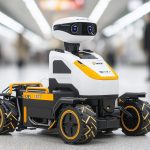“We’re living in one of the most fascinating times in human history for innovation, and AI is at the center. As I see it, just like the Industrial Revolution, the rise of machines and AI will significantly shift the job market.”
– Martín Migoya
The era of AI is reshaping innovation, much like the Industrial Revolution did with the rise of machines. AI’s resurgence, exemplified by ChatGPT’s rapid adoption, highlights its growing influence and potential for disruption. AI, defined as machines with human-like intelligence, is expanding rapidly, fueling curiosity and concern about its use. As AI evolves, so do the efforts to harness its benefits responsibly, introducing new tools and regulations to mitigate risks.
Every month, new tools, rules, or technological advances are launched, expanding the possibilities of AI. The current AI landscape is rich with nuances and possibilities, but has significant risks.
What is the real impact of AI on organizations?
While technologists, academics, and visionaries worldwide agree that AI will profoundly impact most industries in the coming years, many companies investing in AI still need to unlock their full potential. Research conducted by BCG has shown that only 11% of these companies have contributed significant value, and the majority have yet to manage to scale AI beyond pilots.
While AI adoption at scale remains low across industries and functional areas, the research identifies three common behaviors among those achieving better results:
- They prioritize the highest-impact use cases and scale them quickly to maximize value.
- They make data and technology accessible across the organization, avoiding siloed and incompatible tech stacks and standalone databases that impede scaling.
- They recognize the importance of aligned leadership, employees who build and leverage AI, and support staff who promote collaboration and end-to-end agile product delivery.
While technology enables change, more is needed. True transformation requires a holistic approach that includes both technology, processes, and people. AI’s effects differ across industries, offering efficiency and innovation to specific and unique industry problems but also prompting concerns about job shifts and skill demands. AI fundamentally alters how industries function and make choices. Recognizing ethical and regulatory impacts is vital for organizations’ long-term viability.
The Impact on People
Generative AI enhances digital experiences with personalized content and creative ideation for artists and creators. However, it raises ethical and legal questions about originality and authorship. In work contexts, there are different use cases for AI, such as:
- Strategic Definition: Decision-makers use Generative AI for document creation, data analysis, and presentations to boost productivity and innovation.
- Change Management Strategy: AI-generated insights help change managers anticipate resistance, identify stakeholders, and tailor communication strategies to enhance employee engagement. AI-driven scenario planning supports agile change strategies.
- Human Resources Strategy: Integration with AI reshapes HR strategies.
- Geno Tool: Developed by Globant with OpenAI, Geno simplifies talent management through intuitive AI-powered conversations. It streamlines team selection, vacancy management, CV retrieval, scheduling, and candidate assessment, enhancing hiring efficiency.
- “Accelerated Talent” Initiative: Aligns performance assessments with top performer criteria, defining critical attributes for success at Globant.
- Digital Twins and AI Avatars: Used in training, learning sessions, and business calls.
- “Learning Match” Tool: Facilitates connections among individuals with similar learning interests using AI technology.
Ways to address AI implementation
AI is one more technology challenge, but the main difference is that the communication of AI with the incorporation of Generative AI has become a massive wave that no company was able to tackle. The paradigms for handling change remain the same. The difference is the speed required for this change.
Here’s a 7-step program to integrate AI successfully in organizations:
- Create a plan and dare to leap before others do it for you.
- Listen, ask, learn, and relearn.
- Technology is not just “something technical”. It’s essential for accessing crucial information and accelerating change.
- Connect with people. We’re all driven by our purpose. Find out what motivates individuals to drive change and create a connection.
- Metrics, metrics, metrics. Remember to underestimate the importance of data and start measuring from the beginning.
- Be Kind. If you want people to care, take care of them, and they will take care of the change.
- Visualize the change. If it can’t be seen, it doesn’t exist. Develop a strategy to make invisible changes visible.
Every AI transformation is a Culture and Agile transformation
We have a long history of shaping the future of AI, beginning in 2013 with the launch of Data & AI Studio, paving the way for continued innovation.
Our dedicated Cultural Hacking & Agility Studio is committed to guiding organizations through the transformative journey of AI, from becoming aware of its potential and use cases to fully adopting it to unlock value. We recognize that the key to success in today’s AI landscape lies in empowering individuals to harness AI’s potential effectively to deliver business results. Every AI transformation represents far more than a technological shift; it encompasses a profound cultural and agile transformation. It’s a journey that demands a holistic approach, integrating technology with human capabilities and cultivating a flexible, responsive organizational ethos.
Disruptive leadership is vital to this journey, guiding teams through uncertainty, encouraging bold experimentation, and fostering a climate where change is embraced rather than feared. By championing disruptive leadership, organizations can navigate the challenges of AI transformation more effectively, driving meaningful innovation and competitive advantage in today’s dynamic digital landscape.
Our studio specializes in enabling organizations to adapt seamlessly to AI-driven changes, ensuring they survive and thrive in an increasingly competitive environment. Focusing on people-centric strategies, we help businesses align their workforce with AI advancements, equipping them to execute strategic initiatives with precision and agility. We aim to empower organizations to leverage AI as a strategic enabler, driving innovation, enhancing competitiveness, and achieving sustainable growth.




